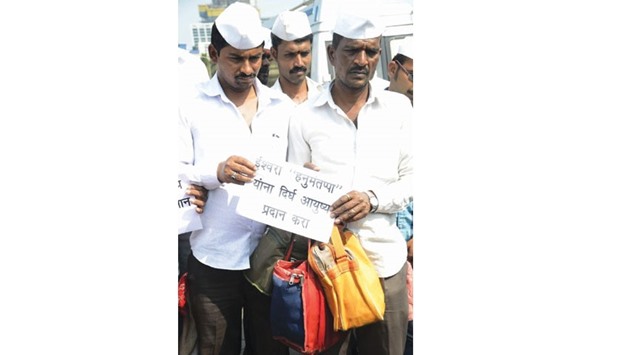A soldier’s condition deteriorated yesterday, two days after his dramatic rescue from under mounds of snow nearly a week after being buried alive in an avalanche on Siachen glacier, the army said.
Hanumanthappa Koppad is “extremely critical” in hospital after he was trapped for six days when a massive block of ice fell onto his army post 19,600ft high in the Himalayas.
Troops rescued him late Monday, days after India said there was little hope of survivors from the disaster on the glacier in Kashmir.
The avalanche killed nine of Koppad’s colleagues and buried him under nearly 25ft of snow in temperatures of minus 45 degrees Celsius.
Koppad, who was found conscious but severely hypothermic, has pneumonia in both lungs, doctors treating him at a New Delhi military hospital have discovered.
“His multi-organ dysfunction state continues unabated. His condition has deteriorated despite aggressive therapy and supportive care,” the army said in a statement.
Bollywood stars, Hindu priests and politicians were among those holding prayers yesterday for Koppad, whose rescue sparked a wave of patriotism for India’s armed forces.
School children in Karnataka gathered outside Koppad’s village home in Dharwad to offer prayers.
Mahadevi, wife of Koppad, termed his survival a ‘rebirth’. “If he has survived miraculously, it is mainly because of his mother’s prayers,” she said.
Koppad’s mother Basavva said she had always been confident that he would survive. “He came to me in my dream, stood beside me and told me that he will return. I prayed to my family deity, took a vow and she (the goddess)has saved my son,” the mother said.
In the financial capital, scores of Mumbai’s famous lunchbox carriers - known as dabbawallahs - gathered on the streets to pray, holding posters with get well messages.
“Nobody survives being buried under snow for four days but he still got out alive. The whole country has come together to pray for him,” one told reporters.
In the holy city of Varanasi, priests lit large traditional oil lamps and chanted devotional prayers for Koppad on the banks of the Ganges which is revered by Hindus.
Politicians and celebrities poured onto social media, including Bollywood superstar Amitabh Bachchan who hailed Koppad as “our jawan (soldier), our protector”.
Cricket legend Sachin Tendulkar said on Twitter he was “praying for Lance Naik Hanumanthappa. Fighter, braveheart”.
Prime Minister Narendra Modi, who visited the hospital on Tuesday, praised “the endurance & indomitable spirit of Lance Naik Hanumanthappa”, and called him “an outstanding soldier.”
Defence Minister Manohar Parrikar extended prayers to “Naik Hanamanthappa who miraculously survived the avalanche at Siachen”.
Army Chief General Dalbir Singh spoke of the soldier’s indomitable mental robustness and his refusal to give in to the harsh elements.
The appreciation of the fighting spirit shown by Koppad came even as several military sources criticised the way the top brass rushed in to express condolences over the death of all those who were hit by the avalanche.
Meanwhile, Indian Navy’s ex-sailor S S Raju has expressed willingness to donate any organ of his body to save the life of the “fellow-brother”.
“I request doctors at the Army Hospital to contact me immediately and I can go to New Delhi... I am ready to donate any organ, including liver, kidney... We must save our fellow brother who is critical,” said Raju, a resident of Bhayander in Thane district near Mumbai.
A woman from Uttar Pradesh too has volunteered to donate a kidney.
Nidhi Pandey, a housewife from Lakhimpur Kheri, 167km from Lucknow, contacted the helpline of a local news channel and sought to know how she can contact the hospital and proceed with her wish to donate a kidney to Koppad.
About 150 soldiers, two rescue dogs - Dot and Misha - and some sophisticated radars all were part of the heroic rescue efforts at Siachen since February 3, when an ice wall broke off and fell on the army post located in northern glacier. The debris covered an area of 800 x 1,000m.
Thed soldiers, including specialised rescue teams, began round-the-clock search operation in Siachen, where the day temperature was an average of minus 30 degrees Celsius and night temperature fell to around minus 55 degrees Celsius. A medical aid post was also set up.
The military airlifted rock drills and electrical saws to break the blue ice that is harder than concrete.

Mumbai’s ‘dabbawalas’ pray for Hanumanthappa Koppad, who was miraculously found alive after remaining under a huge mass of snow, yesterday.
